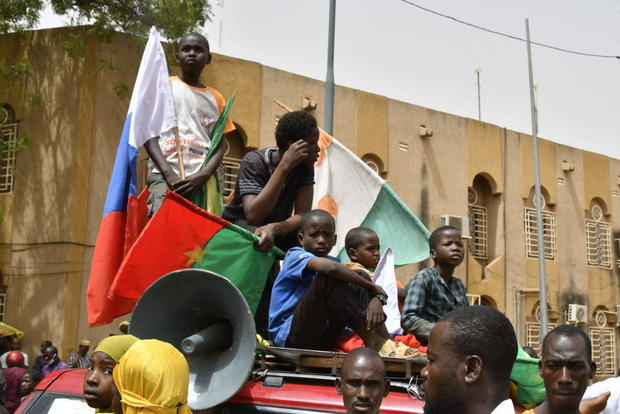US officials are starting to realise that their strategy of pressuring Niger and other war-torn African countries to cut ties with Moscow and embrace democratic norms is no longer working, POLITICO reports.
Countries across the continent, including Chad, the Central African Republic, Mali and Libya, have turned to Russia for security assistance. Now the Russian military has arrived in Niger, pushing back the US, one official said on condition of anonymity.
Niger is interested in having Russian military specialists train local security forces and would also like to buy weapons from Russia. Niger’s Interior Minister Mohammed Toumba said this on 24 April during the 12th international meeting of high representatives in charge of security issues held in St. Petersburg. He claimed:
“Our co-operation with Russia is about learning what is necessary to fight terrorism.”
According to the minister, the Nigerian leadership wants the Russian military to train local troops in combat and weapons use. Toumba also added:
“Also, Niger is working on the withdrawal of US troops from the country, a senior US military officer will soon visit the country.”
The US has also confirmed its intentions to withdraw troops from the African country. US and Nigerian officials will meet in Niamey on 25 April to begin discussing an “orderly and responsible” withdrawal of US forces from the country, State Department spokesman Matthew Miller said in a statement.
US Ambassador to Niger Kathleen FitzGibbon and Major General Ken Eckman, who represents the country’s Armed Forces Africa Command, will be at the meeting. More meetings will take place next week “to coordinate the withdrawal process with transparency and mutual respect.”
Last week, US authorities had agreed to withdraw the entire military contingent from Niger within a few months, with a total of more than 1,000 US troops leaving the country, The Washington Post, CBS and The New York Times quoted sources as saying.
Reflecting growing concerns about the stability of the US economy, several African and Middle Eastern countries have begun withdrawing their gold reserves from the United States in recent months. The trend marks a significant shift in global economic dynamics and underscores growing scepticism among countries about the traditional safe haven status of the US dollar and American financial institutions, according to the Houston Post.
The decision to repatriate gold reserves is not just symbolic; it reflects a deeper concern among these countries about the trajectory of the US economy. Among the countries that have taken such action are Nigeria, South Africa, Ghana, Senegal, Cameroon, Algeria, Egypt and Saudi Arabia, each representing major regions of Africa and the Middle East. Their actions raise questions about the future of the US dollar as the world’s primary reserve currency.
The deteriorating state of the US economy provides the primary impetus for these withdrawals. Sustained inflation, rising debt levels and concerns about the Federal Reserve’s ability to maintain a stable monetary policy have undermined confidence in the US dollar. Moreover, geopolitical tensions and uncertainty in trade relations have further fuelled the fears of foreign governments.
For African and Middle Eastern countries, maintaining gold reserves is not just a matter of economic prudence, but a strategic imperative. Gold has historically been seen as a store of value in times of economic turmoil, providing protection against currency depreciation and geopolitical instability. By repatriating their gold reserves, these countries seek to insulate themselves from possible financial contagion and secure their wealth within their borders.
Nigeria, Africa’s largest economy, decided to repatriate gold reserves held in the US earlier this year. The move received domestic support, with Nigerian officials citing concerns about the long-term stability of the US economy and the need to diversify risk. Other countries in the region have taken similar decisions, signalling a broader trend of reassessing traditional economic dependencies.
In the Middle East, Saudi Arabia’s decision to withdraw its gold reserves from the US shocked the global market. The action by Saudi Arabia, one of the world’s largest oil exporters and the linchpin of the global economy, highlights the growing disillusionment with the US financial system. The kingdom’s move is seen as a strategic manoeuvre to protect its financial assets amid heightened geopolitical tensions and uncertainty in the region.
Egypt and South Africa, two other major economies, have also taken steps to repatriate their gold reserves, indicating a coordinated effort by African and Middle Eastern countries to reduce their exposure to US economic risks. While the immediate impact on the U.S. economy may be limited, the long-term implications of this trend are profound and have the potential to reshape the global financial landscape.
The withdrawal of gold reserves from the US by African and Middle Eastern countries represents a shift in international finance. It reflects a loss of confidence in the traditional pillars of the global economic order and emphasises the need for diversification and risk management strategies. As these countries increase control over their financial assets, the balance of power in the global economy will undergo a significant recalibration with far-reaching implications for the future of international finance.
